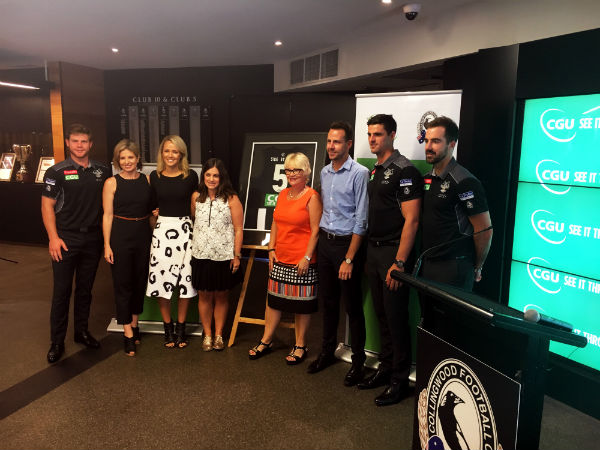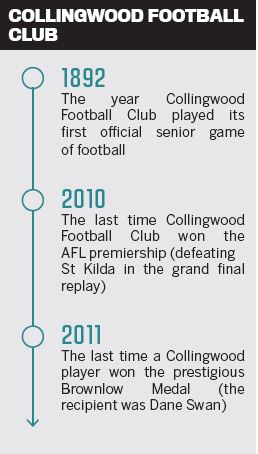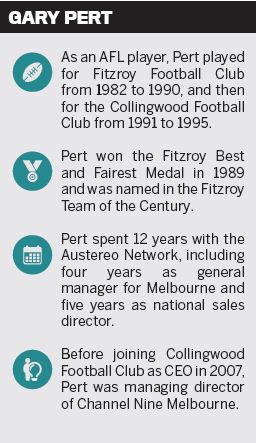Gary Pert, CEO of the Collingwood Football Club, talks about building successful business partnerships and driving a high-performance culture
The Collingwood Football Club is the Australian Football League’s (AFL) most polarising club, but also remains one of its most successful.
On May 6, Collingwood played its 125th anniversary game against its long-time rival Carlton. In 2017, the man at the helm of the club continues to be Gary Pert, who’s occupied the chief executive’s seat for 10 years now. It wasn’t his first stint with Collingwood; during his own 233-game, 14-year AFL career, Pert
played 70 games for the Magpies.
Under Pert’s leadership, Collingwood has financially doubled in size and qualified for three AFL grand finals, winning the premiership in 2010. In terms of its membership base, the club recorded 42,498 members in 2008. In 2013, the figure had grown to 80,456.
It’s also been under Pert’s leadership that
CGU has become one of Collingwood’s key sponsors. The insurer is one of the club’s four premium sponsorship partners, and it was announced in March that the partnership had been extended for a further five years.
Alignment
Pert reflects on the history of the Collingwood-CGU partnership.
“I remember back to the early conversations we had with CGU, when they were looking at sponsoring the club,” he says.
“When we talked to them about what our values were as a club, what we stood for in the community and what we were trying to achieve apart from just winning games of footy on the weekend, it was amazing then to hear back from CGU about what their ambitions were and to see that alignment.”
Pert talks about some of the initiatives that Collingwood has partnered with CGU to promote over the past seven years.
“When we started talking to CGU about the fact that we were looking to support women’s sport with our women’s AFL team and netball team, CGU was the first of our sponsors to make a commitment to say that it was something that was very important to them as well, and they wanted to be involved and a key driver of those programs,” he says.
Pert also mentions Collingwood’s Magpie Nest housing project, which provides housing for the homeless.
“We’ve taken about 150 homeless people off the street and put them into houses and provided facilities and support around them to really help turn their lives around,” he says.
“That’s something that, again, was very much aligned with what CGU wanted to do [to] make a difference in the community.”
Lost opportunity
Asked about steps taken – or not taken – in business partnerships that prevent parties from ultimately achieving great success, Pert describes what he characterises as the “lost opportunity”.
“I’ve seen sponsorships and I’ve talked to sponsors who have sponsored sporting clubs where they see that by signing up for the initial sponsorship, that’s all the work that’s done and now that they get their name up there on signage or even on a particular jumper, then that’s what it’s all about,” he explains.
For Pert, there’s a lost opportunity when parties fail to realise that signing the deal should mark only the beginning of the process.
“Once we start talking to clients like CGU and our other partners around the club, we want to know quite intimately what are the challenges? What are their ambitions? What are they trying to achieve? What do they want out of the partnership? And we also then present back to them where our challenges and our innovations and our growth is going to be,” he says.
“It’s amazing out of those conversations how often we find programs and initiatives that we can do together. In many ways, these commercial partnerships are actually helping us grow and drive innovation in various areas.”
Pert emphasises the need for potential partners to enter an agreement only where there’s a clear understanding of what they want to get out of the deal.
“We agree upfront the goals and the benchmarks that we want to achieve,” he says.
“We very much encourage that if you’re going to be spending money on this partnership, you’re going to be very clear on the sort of return and results that you want, and then we make sure that we work with our partners to deliver that and, in the majority of cases, over-deliver.”
According to Pert, another factor of integral importance to successful partnerships is brand and value alignment.
“We’ve been talking to organisations where we’re just looking at them and thinking, ‘Do their values and integrity and their professional standards align with what we see as important and what we stand for?’ And if that’s not the case, it’s really important upfront not to go down that partnership path.
“In many cases, the reason why we’ve had such long and successful partnerships is because they seem to be so easy, because we spend so much time allowing potential new partners to understand us. We’re very transparent; we’re very open and we very much declare what we’re about and what are our priorities. We expect that same sort of transparency from our potential partners as well.
“Once you establish that, everything else seems to flow from it, but I would say that’s what organisations more and more are looking for and, in many cases, when I see sponsorships or partnerships that aren’t working with particular clubs, you can take it back to the point, that in many cases, they probably shouldn’t have been trying to work together in the first place, and there wasn’t that understanding and appreciation.”
The right line-up
As Collingwood’s CEO, Pert has also achieved substantial success in creating a high-performance culture within the club. So, precisely what has he learned as to how to get the right people on board and inspire them to achieve optimal results for the business?
“The way we do it … because it is such a high-performance environment and there are such high expectations and such high demands right throughout the organisation, [it’s about] making sure that we get people who are very much in line with our values as a club, so they will thrive within that environment,” Pert says.
“These are people whose ambitions and goals about what they’re trying to achieve are very much what we’re trying to do as well. The values that we establish are what align our on-field with our off-field as our club. We have the same set of values throughout the whole organisation, and that alignment and transparency are what creates the integrity through the club.
“I think that’s a key element that you’ll see throughout all high-performance organisations. You’ll never find a situation where one particular area of the organisation is on one path with a different set of values and standards, and then there’s another on a completely different path. That alignment is critically important to us.”
And for Pert, it’s not just about recruiting right, but also investment in those recruits.
“We see that getting the best people is really important, then giving those people every opportunity to be their best. And that’s about having the best facilities and the best coaches and the best expertise and support, and then making sure that we’ve got people on-field and off-field that are constantly striving to be the best they can possibly be.
“If you’ve got everyone through the whole organisation pushing to those sorts of ambitions, you’re on a pretty strong path.”




